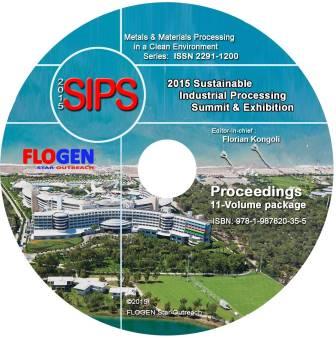2015-Sustainable Industrial Processing Summit
SIPS 2015 Volume 4: Meech Intl. Symp. / Mining Operations
| Editors: | Kongoli F, Veiga MM, Anderson C |
| Publisher: | Flogen Star OUTREACH |
| Publication Year: | 2015 |
| Pages: | 275 pages |
| ISBN: | 978-1-987820-27-0 |
| ISSN: | 2291-1227 (Metals and Materials Processing in a Clean Environment Series) |

< CD shopping page
Co-Existence of Large-Scale Gold Mining with Artisanal Gold Miners
Jeffrey Selder1; Marcello Veiga2;1, Vancouver, Canada; 2UBC-MINING, Vancouver, Canada;
Type of Paper: Regular
Id Paper: 489
Topic: 4
Abstract:
Artisanal Gold Mining (AGM) is proliferating rapidly all over the world. There are 16 million artisanal gold miners in more than 70 developing countries producing around 400 tonnes/a of gold. The concept of co-existence of large-scale gold mining (LGM) companies with artisanal gold miners (AGM) as a way to reduce conflicts is not new and had been used in many sites.
Four types of agreements between LGM and AGM are discussed:
1. The company selects an area and lets the miners work without any technical assistance.
2. The company selects an area and provides technical assistance and delegate to AGM the management and operation of the mine and plant.
3. The company trains the miners working in their concessions and buy their ores.
4. The company works with the artisanal miners in partnership and share the results.
The first model is the least desirable since the company has no control about the pollution created by AGM. The second model seems ideal but, when something wrong happens, the liability still belongs to the company. In the third model, the company establishes a minimum gold grade acceptable to buy the ore. Problems with the credibility of the chemical analyses create disagreements. The fourth process is a total partnership between AGM and LGM. Both partners share the costs and risks of the operation. The mineral title is transferred to a new company established by the LGM and AGM. The company establishes the mine and processing plant and trains the AGM to be operators under the LGM management. The operation will be based on a small-scale mining engineering approach, utilizing best practice engineering to under the resource modelling, mining engineering approach and mineral processing plant, which will be tailored to the AGM operation using clean technology. Education and training are a key component. Under this arrangement, it is possible to create a long-term sustainable approach to the mining operation, which will also help drive economic diversification planning for affected local communities.